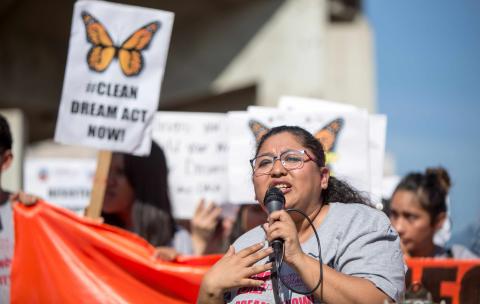NCR received the following statement from the Association of Jesuit Colleges and Universities Conference of Education Deans. It was signed by 19 members of that conference, which is comprised of deans and professors for schools of education at Jesuit colleges and universities in the United States. This statement follows similar statements issued by the presidents of Jesuit colleges and universities and by student body presidents of Jesuit colleges and universities.
The complete text of the statement follows:
**********
As the education deans of the nation's Jesuit colleges and universities, we are compelled to join our university presidents and others who have raised their collective voices to support our DACA students (AJCU Presidents Statement; Jesuit Student Government Presidents Statement). Through our work, we prepare the teachers, principals, and other educational support providers for the youth of our nation. The Jesuit educational tradition values the right of all peoples to a meaningful and quality education, which is transformative for both the learner and the teacher. Our DACA students are no exception. Through no fault of their own, they came to the United States in search of opportunities. They have been documented and thoroughly vetted, are among our most successful students, and are preparing for positions of leadership and service in various industries in the United States. Deporting these young people just as they are poised to make strong contributions to this country—after investing so many resources to educate them in our public schools—is poor public policy and not in the public interest.
As education leaders, we are aware of the unintended consequences that deportation, or even the threat of deportation, has on an entire school community. For example, in the Los Angeles Unified School District (LAUSD)—the second largest in the country—roughly one in four students is undocumented or has a parent who is undocumented. While these numbers may seem dramatic, Los Angeles is not unlike other large urban cores in our country. This reality forces the question—what are the unintended consequences for our school communities under a constant threat of deportation? The story of Yuleni and her sister Fatima, young students in Los Angeles schools and the daughters of Romulo Avelica-González, help to put human faces on these dire consequences. Immediately after Romulo, an undocumented immigrant, dropped off Yuleni at school last February, he was arrested by Immigration and Customs Enforcement officials as Fatima caught the arrest on camera.

Rosa B., 23, a recipient of the Deferred Action for Childhood Arrivals program, who was brought to the U.S. when she was 4, speaks at a rally in Los Angeles Feb. 3 in support of a permanent legislative solution for immigrants. (CNS /Monica Almeida, Reuters)
This parent’s arrest at the school house door for being undocumented had a chilling ripple effect on the whole school community, even prompting the school to tell students whose parents are in the U.S. illegally to develop family plans for what to do if a parent is detained or deported. No child should have to bear this burden. Under these conditions, it is near impossible for students to learn and for teachers to teach. When loved ones feel unsafe under the threat of deportation, the teaching and learning of all the children in our P-12 schools suffers tremendously. That is the most significant unintended consequence of this misguided policy.
DACA students contribute greatly to the common good of American society. The United States of America is their home. They participated in the DACA program in good faith, and have much to offer this country through their hard work and talent. We cannot betray them by ending the DACA program and sending them to countries they do not even know. As noted above, deporting DACA students or their undocumented family members will have repercussions beyond the individuals and families involved; such actions disrupt the education of entire communities. As a society, we cannot afford the unintended educational consequences such policy actions would have. We urge our leaders to find a permanent solution for the DACA program for the benefit of our youth and our country.
- Dr. Virginia Roach Dean, School of Education Fordham University
- Dr. Heidi Barker Interim Academic Dean Regis University
- Dr. Jennifer Friend Dean, College of Health and Human Services Rockhurst University
- Dr. Molly A. Schaller Interim Dean, School of Education Saint Louis University
- Dr. Joseph V. Doria, Jr. Dean, Caulfield School of Education Saint Peter's University
- Dr. Sabrina Zirkel Dean of the School of Education and Counseling Psychology Santa Clara University
- Dr. Deanna Sands Dean, College of Education Seattle University
- Dr. Shabnam Koirala-Azad Dean of Education University of San Francisco
- Dr. Debra Pellegrino Dean, Panuska College of Professional Studies University of Scranton
- Dr. Paul Gore Dean, College of Professional Sciences Xavier University
- Dr. Stanton Wortham Dean, Lynch School of Education Boston College
- Dr. Jeffrey R. Lindauer Dean, School of Education and Human Services Canisius College
- Bob Hannafin Dean, Graduate School of Education & Allied Professions Fairfield University
- Dr. Vincent Alfonso Dean, School of Education Gonzaga University
- Dr. Catherine A. Rosemary Co-Chair, Department of Education and School Psychology John Carroll University
- Dr. Shane Martin Dean, School of Education Loyola Marymount University
- Dr. David Slavsky Interim Dean, School of Education Loyola University Chicago
- Dr. Joshua Smith Dean, School of Education Loyola University Maryland
- Dr. William Henk Dean, College of Education Marquette University
Advertisement





